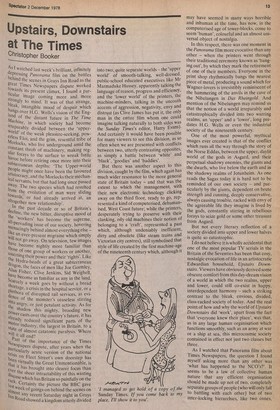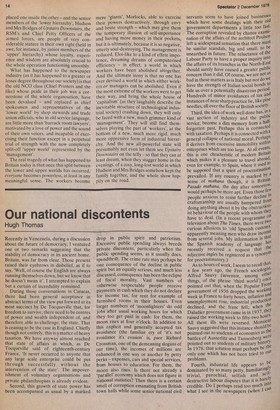Upstairs, Downstairs at The Times
Christopher Booker
As I watched last week's brilliant, infinitely depressing Panorama film on the battles behind the scenes in Grays Inn Road as the great Times Newspapers dispute worked towards its present climax, I found a particular image coming more and more strongly to mind. It was of that strange, bleak, intangible mood of despair which hangs over H.G. Wells's vision of the England of the distant future in The Time Machine, in which society had become irreparably divided between the 'tipperworld' of the weak pleasure-seeking, powerless Eloi, and the grim, resentful tribe of Morlocks, who live underground amid the constant throb of machinery, making regular forays to the surface to wreak futile havoc before retiring once more into their subterranean depths: 'The Upper-world People might once have been the favoured aristocracy, and the Morlocks their mechanical servants, but that had long since passed away. The two species which had resulted from the evolution of man were sliding towards, or had already arrived at, an altogether new relationship'. In the past decade or so of Britain's decline, the new bitter, disruptive mood of the 'workers' has become the supreme, all-pervading issue of our society, hovering .menacingly behind almost everything else — lIke an ever-present migraine which simply will not go away. On television, few images have become nightly more familiar than those of one group of workers or another, asserting their power and their 'rights'. Like the Hydra-heads of a great subterranean dragon, the faces of men like Joe Gormley, aan Fisher, Clive Jenkins, Sid Weighell, have become as familiar as any in the land. Scarcely a week goes by without a bread shortage, a crisis in the hospital service, or a Plethora of disrupted rail services, as evidence of the monster's ceaseless stirring into angry, or just petulant activity. As for the shadow this mighty, brooding new Power casts over the country's future, it has already reduced significant parts of the motor industry, the largest in Britain, to a state of almost catatonic paralysis. Where will it all end? Part of the importance of the Times "e‘vspapers dispute, after years when the Particularly acute version of the national eLrisis on Fleet Street's own doorstep has 11.ieen virtually the Great Unmentionable, is _Lnat it has brought into clearer focus than ',..11.er the sheer intractability of this wasting Isease which has Britain so painfully on the lackCertainly the picture the BBC gave ,a,st week of goings-on behind the scenes on l'iroost any recent Saturday night in Grays 'no Road showed a kingdom utterly divided into two, quite separate worlds — the 'upper world' of smooth-talking, well-dressed, public-school educated executives like Mr Marmaduke Hussey, apparently talking the language of reason, progress and efficiency, and the 'lower world' of the printers, the machine-minders, talking in the uncouth accents of aggression, negativity, envy and distrust (as Clive James has put it, the only man in the entire film whom one could imagine talking naturally to both sides was the Sunday Times's editor, Harry Evans). And certainly it would have been possible for many viewers to see this division, as so often when we are presented with conflicts between two, utterly contrasting opposites, as simply a battle between 'white' and 'black', 'goodies' and taddies'. But there was another aspect to this division, caught by the film, which again has much wider resonance to the more general state of Britain today — and that was the extent to which the management, with their new electronic technology clicking away on the third floor, ready to go, represented a kind of computerised, dehumanised, West Coast future; while the printers, desperately trying to preserve with their clanking, oily old machines their notion of belonging to a 'craft', represented a past which, although undeniably inefficient, dirty and obsolete (like steam trains and Victorian city centres), still symbolised that style of life created by the first machine-age of the nineteenth century which, although it may have seemed in many ways horrible and inhuman at the time, has now, in the computerised age of tower-blocks, come to seem 'human', colourful and an almost universal object of nostalgia.
In this respect, there was one moment in the Panorama film more evocative than any other — when the printers went through their traditional ceremony known as 'banging out', by which they mark the retirement of one of their members. Everyone in the print shop rhythmically bangs the nearest piece of metal, producing a sound which for Wagner-lovers is irresistibly reminiscent of the hammering of the anvils in the cave of the Nibelungen in Dos Rheingold. And mention of the Nibelungen may remind us that the notion of a world irreparably and catastrophically divided into two warring realms, an 'upper' and a 'lower', long predates H.G. Wells or even the industrial society of the nineteenth century.
One of the most powerful, mythical images ever created is that of the conflict which runs all the way through the story of the Norse Eddas, between the upper, daylit world of the gods in Asgard, and their perpetual shadowy enemies, the giants and the dwarfs, who live below the earth and in the shadowy realms of Jotunheim. As one reads the Sagas today it is hard not to be reminded of our own society — and particularly by the giants, dependent on brute strength and cunning, deeply conservative, always causing trouble, racked with envy of the agreeable life they imagine is lived by the gods, constantly stirring in rebellious forays to seize gold or some other treasure from Asgard.
But not every literary reflection of a society divided into upper and lower halves is quite so catastrophic.
I do not believe it is wholly accidental that one of the most popular TV serials in the Britain of the Seventies has been that cosy, nostalgic evocation of life in an artistocratic Edwardian household, Upstairs Downstairs. Viewers have obviously derived some obscure comfort from this day-dream vision of a world in which the two realms, upper and lower, could still co-exist in happy, interdependent harmony — such a striking contrast to the bleak, envious, divided, class-racked society of today. And the real point, of how and why the world of Upstairs Downstairs did 'work', apart from the fact that 'everyone knew their place', was that, as in any large human organisation which functions smoothly, such as an army at war or a ship at sea, this microcosmic society contained in effect not just two classes but three.
As I watched that Panorama film about Times Newspapers, the question I found myself asking more than any other was 'what has happened to the NCO's?'. It seems to be a law of collective human nature that any efficient organisation should be made up not of two, completely separate groups of people (who will only fall to battling with each other) but of two inter-locking hierarchies, like two cones, placed one inside the other — and the senior members of the 'lower hierarchy', Hudson and Mrs Bridges of Upstairs Downstairs, the RSM's and Chief Petty Officers of the armed forces, are people of very considerable stature in their own right (held in awe, for instance, by junior members of the 'upper' hierarchy) whose loyalty, experience and wisdom are absolutely crucial to the whole operation functioning smoothly. What has happened to the newspaper industry (as it has happened to a greater or lesser degree throughout our society) is that the old NCO class (Chief Printers and the like) whose pride in their job was a cornerstone of the whole organisation, have been devalued — and replaced as chief spokesmen and representatives of the 'lower world' by shop stewards and trade union officials, who in old service language, are little more than 'barrack room lawyers', motivated by a love of power and the sound of their own voices, and incapable of exercising their function except in a perpetual trial of strength with the now completely split-off 'upper world' represented by the 'management'.
The real tragedy of what has happened to Britain today is that once this split between the lower and upper worlds has occurred, everyone becomes powerless, at least in any meaningful sense, The workers become mere 'giants', Morlocks, able to exercise their powers destructively, through envy andbrute strength — which may give them the temporary illusion of self-importance and having more money in their pockets, but it is ultimately, because it is so negative, utterly soul-destroying. The management is reduced, Eloi-like to a kind of effete impotence, dreaming dreams of computerised efficiency — in effect, a world in which workers have been abolished altogether. And the ultimate irony is that no one has ever devised a world in which either workers or managers can be abolished. Even if the most extreme of the workers were to get their way, and bring the whole house of 'capitalism' (as they laughably describe the inevitable structure of technological industrial society) crashing down, they will only be faced with a new, much grimmer kind of 'management'. They will still find themselves playing the part of 'workers', at the bottom of a new, much more rigid, much more oppressive form of industrial hierarchy. And the new all-powerful state will presumably not even let them see Upstairs Downstairs on the telly — so that they can at least dream, when they stagger home in the evenings, of a cosy, long-lost world in which Hudson and Mrs Bridges somehow kept the family together, and the whole show happily on the road.







































 Previous page
Previous page